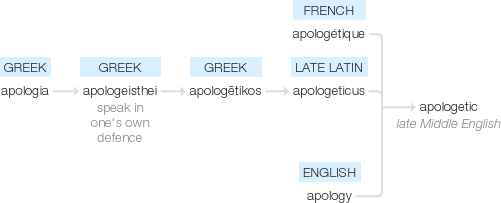Apologetic
late Middle English (as a noun denoting a formal justification): from French apologétique or late Latin apologeticus, from Greek apologētikos, from apologeisthei ‘speak in one's own defence’, from apologia (see apology). The current sense dates from the mid 19th century.
wiktionary
From French apologétique, from Ancient Greek ἀπολογητικός(apologētikós, “of or suitable for defense”), from ἀπολογέσθαι(apologésthai, “to speak in defense of”).
etymonline
apologetic (adj.)
1640s, "vindicatory, containing a defense," from French apologétique, from Latin apologeticus, from Greek apologetikos "defensible," from apologeisthai "speak in one's defense," from apologos "an account, story," from apo "away from, off" (see apo-) + logos "speech," from PIE root *leg- (1) "to collect, gather," with derivatives meaning "to speak (to 'pick out words')." Meaning "regretfully acknowledging failure" is by 1836 (apologetic for himself).
